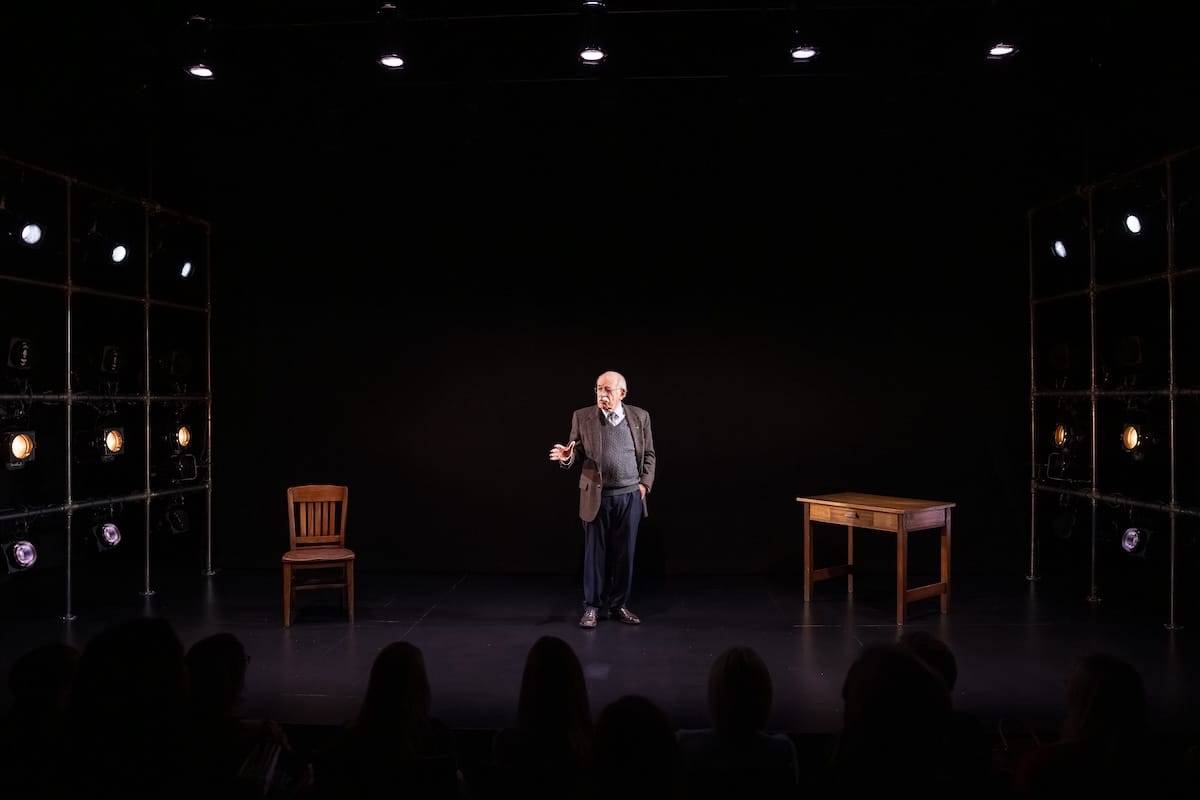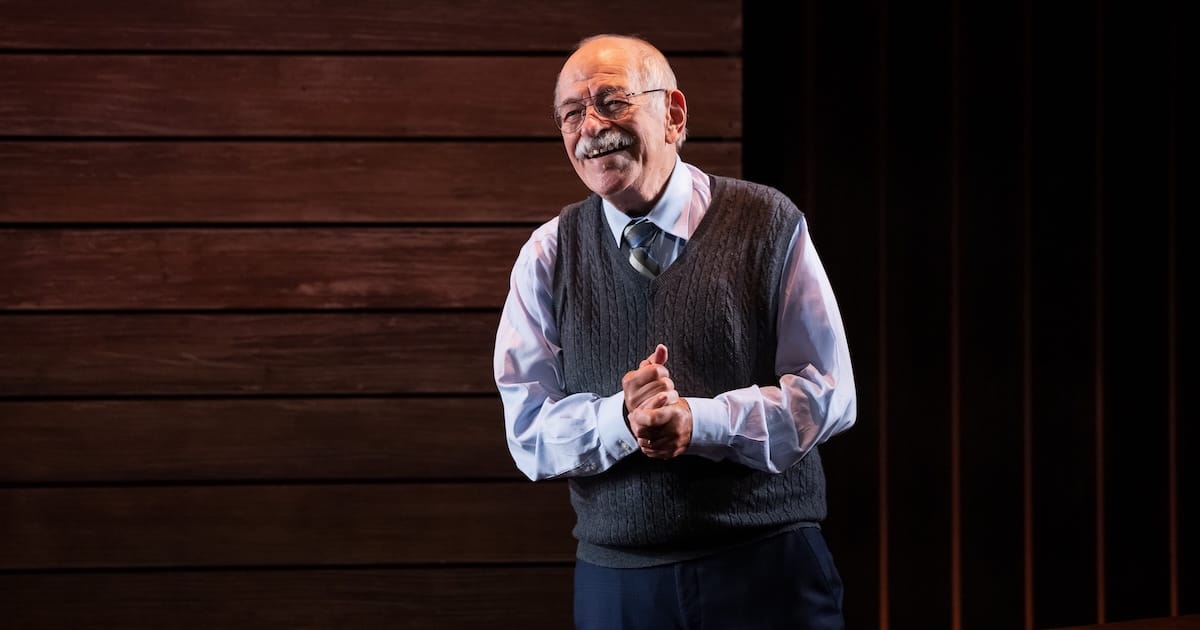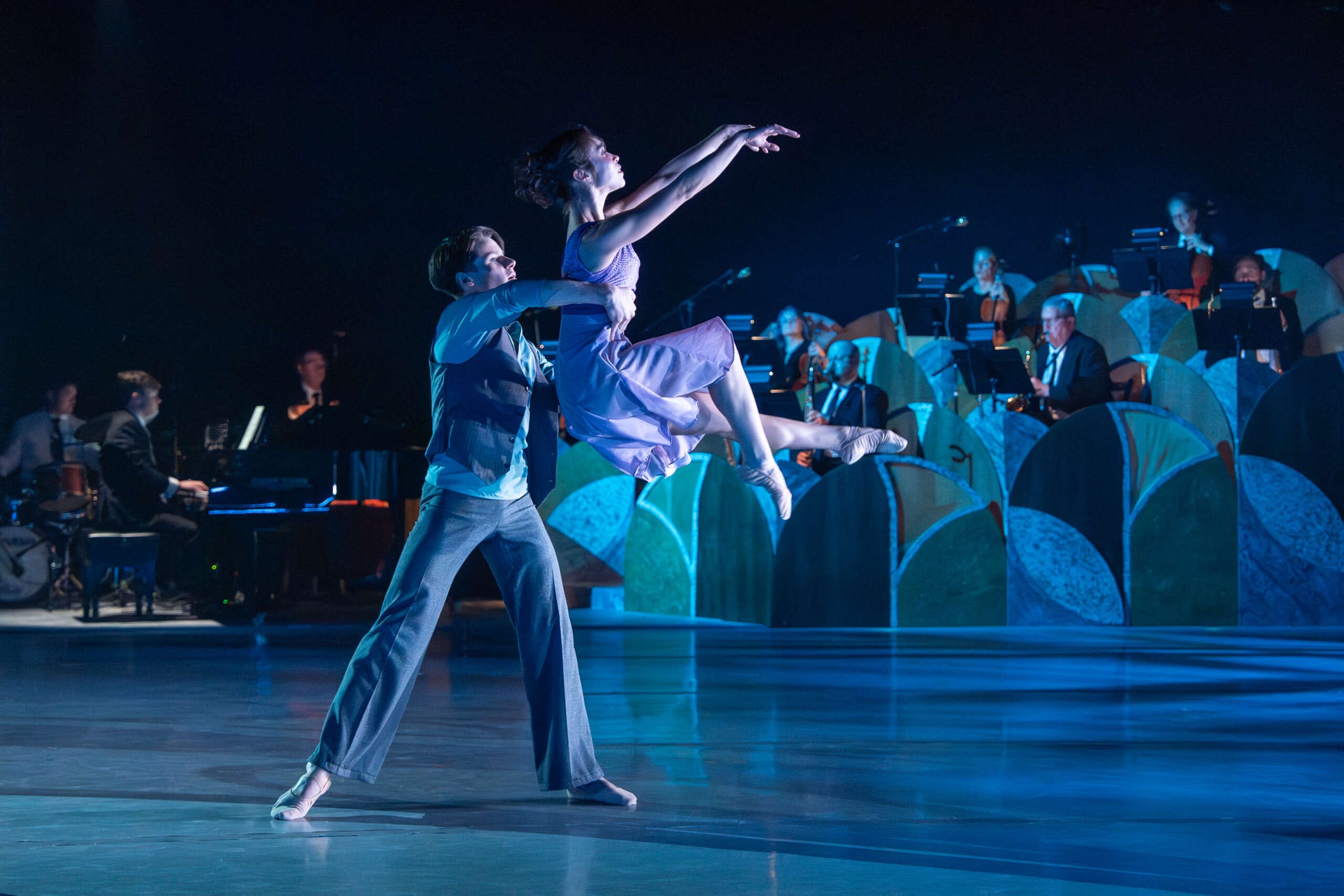DCPA Theatre Company opens its season with a stark, affecting one-man play starring Kenneth Tigar.
Storytelling has always been a way to pass history from one generation to the next, whether through Homer’s epic poetry or family tales shared around a living room. The Happiest Man on Earth, the season opener for the Denver Center Theatre Company, feels very much in line with that tradition.
Based on Eddie Jaku’s best-selling memoir, the one-man play recounts his life as a German Jew who survived the unimaginable horrors of the Holocaust, escaped from multiple concentration camps, including Auschwitz, and eventually rebuilt a life in Australia.
Directed by Ron Lagomarsino, the production invites the audience to experience Jaku’s story as if he were telling it himself, sitting across the table. Kenneth Tigar, a seasoned stage and screen veteran, embodies the role with warmth and gravity, guiding us through episodes of terror, resilience, and, finally, hope.
To start the performance, Tigar enters casually through the house, greeting patrons with small talk before gently mocking the banality of pleasantries. This easy rapport makes Jaku’s transition into his traumatic past all the more arresting because of the warm relationship he establishes with the audience right away.

James Noone’s scenic design underscores the intimacy of the evening by offering very little. | Photo: Jamie Kraus Photography
Bare stage, powerful presence
James Noone’s scenic design underscores the intimacy of the evening by offering very little. For most of the 75-minute performance, the stage is stripped down to a chair and a black curtain. Later, a wall of wooden slats lit in ominous red evokes the camps, but the simplicity is deliberate. Johanna Pan’s costume design keeps Tigar in a suit jacket, tie and cozy looking sweater — a reminder that Jaku speaking not as a theatrical character but as himself.
Harold Burgess’s lighting and Brendan Aanes’s sound design picks up where the scenery leaves off. Visible rigs and projected beams make no attempt to disguise theatrical illusion. Instead, the effects are exposed, mirroring Jaku’s unflinching honesty.
The soundscape designed by Aanes ranges from lightly played music to sharp, unsettling cues, like gunshots, environmental noises in the camps and the distant rumble of trains. These choices are not delicate background texture but forceful reminders of the world Jaku survived, jolting the audience back into his lived reality.
At the center of the play is Tigar’s remarkable ability to slip seamlessly among roles. In addition to Jaku, he embodies Nazi guards, fellow prisoners, family members, and strangers who alternately aid or threaten him.
This versatility is technically impressive and keeps the narrative moving briskly. Yet it also creates a curious distance. In the most searing moments — accounts of brutality, betrayal or near-death escapes — the theatrical switching can feel like a shield. You sometimes wish Tigar would stay with Jaku’s voice, stripped of artifice, and speak plainly.
Still, when Tigar does that, the effect is devastating. His closing monologue, where Jaku reflects on building a life in Australia and choosing joy despite grief, lands with a simple honesty that lingers long after the lights fade.
Enduring lessons for today
For a play titled The Happiest Man on Earth, much of the runtime is necessarily harrowing. Jaku’s escapes from Auschwitz, his near-death on a forced march and the betrayals he suffered occupy most of the script. The happiness of the title arrives almost as a coda, a brief reflection on the family he built and the peace he eventually found.
As theatre, this is a straightforward production. There are no flashy effects, no fourth wall to hide behind. Instead, it asks us to listen to a story about a life that embodies both the depths of cruelty and the heights of endurance. That simplicity makes it a strong choice for introducing younger audiences to Holocaust history, though it is not for the faint of heart.
For those willing to sit with the weight of Jaku’s past, The Happiest Man on Earth offers a deeply human experience: a story passed down, spoken aloud, ensuring that memory endures. And Tigar’s performance ensures Eddie Jaku’s declaration of happiness is not naïve optimism, but the hard-won choice of someone who has seen the worst of humanity and still believed in its best.
A Colorado-based arts reporter originally from Mineola, Texas, who writes about the changing world of theater and culture, with a focus on the financial realities of art production, emerging forms and arts leadership. He’s the Managing Editor of Bucket List Community Cafe, a contributor to Denver Westword and Estes Valley Voice, resident storyteller for the Bonfils-Stanton Foundation and co-host of the OnStage Colorado Podcast. He holds an MBA and an MA in Theatre & Performance Studies from CU Boulder, and his reporting and reviews combine business and artistic expertise.






This review beautifully captures the raw emotional power of The Happiest Man on Earth. Kenneth Tigars performance is nothing short of astonishing, bringing Eddie Jakus story of resilience and hope to life with incredible intimacy and honesty. A deeply moving and unforgettable experience.